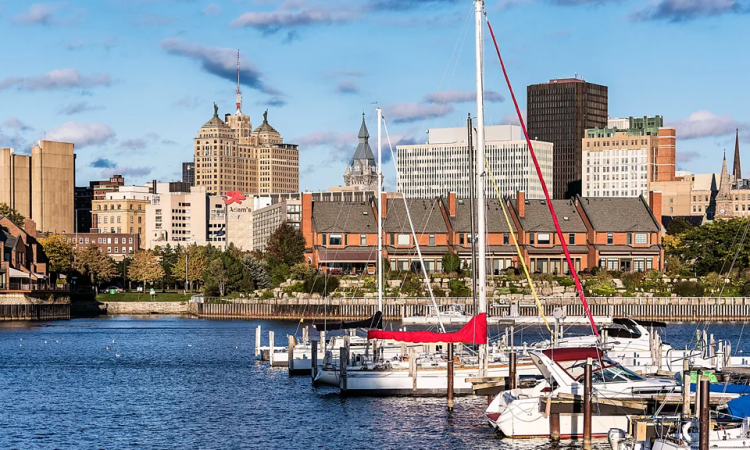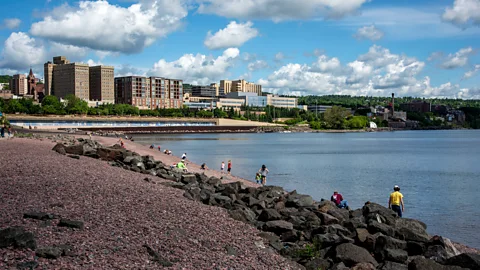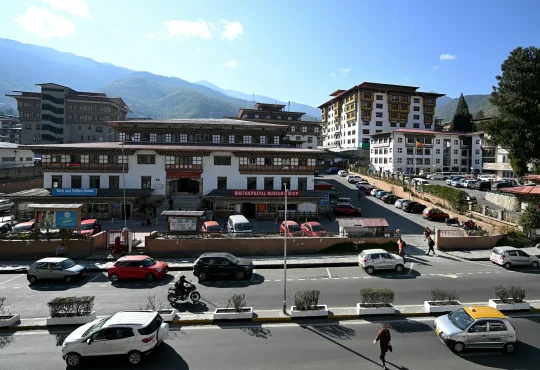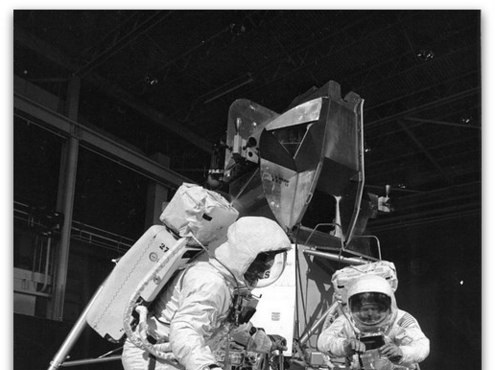
Climate change is leading to more intense heatwaves and storms in many parts of the United States, so can some cities provide a refuge from extreme weather?

Over the past few years, the city of Buffalo, New York, has been all over the headlines. But instead of US media focusing only on the city’s occasional epic snowstorm, Buffalo is making news for its (perhaps surprisingly) moderate year-round climate – at a time when other parts of the world are becoming uninhabitable because of climate change.
This conversation kicked off in 2019, when Buffalo’s mayor Byron Brown declared, during a state of the city address, that Buffalo could be a “climate refuge city”, a place where residents of the hurricane-prone Southeast or wildfire-ravaged West, for example, could move to escape climate-induced disasters.
A local economic development organisation, Invest Buffalo Niagara, picked up on the mayor’s climate haven claim and ran with it. It was an attractive pitch: though the air and water temperatures of this post-industrial city on the shores of Lake Erie will rise as the climate warms, climate scientists don’t anticipate an increase in weather-related disasters there in the coming decades.
On the “Be in Buffalo” campaign website, the city council claims that Buffalo is “better protected from” frequent drought, “unliveable heat” and more frequent and intense weather-related disasters. The campaign also mentions Buffalo’s abundant fresh water supply due to its close proximity to the Great Lakes.
Some of these claims are backed by science. “I really could not find any type of extreme weather [that was increasing] in Buffalo and Western New York,” Stephen Vermette, a professor of geography at Buffalo State University, tells BBC Future Planet.
“I’m not saying climate change is going to be good for Buffalo, or Buffalo is going to be an oasis,” he says. “We’re not an oasis, we suck less.” In other words, the city might be slightly better off than other parts of the country because, while it will see increases in air and water temperatures, Vermette’s research indicates it won’t see an increase in the number of extreme weather events.
Buffalo’s reputation for milder weather actually goes back more than a century; an early 1900s newspaper headline Vermette dug up reads, “Buffalo comfortable while other cities of the country swelter”.
Vermette’s conclusions soon took on a life of their own in the media, and he says they have sometimes been repeated without an accurate understanding of his underlying research.
Buffalo is not the only city embracing the idea of being a climate refuge. Across the upper Midwest and Northeast especially, cities like Duluth in Minnesota, Ann Arbor in Michigan, Madison in Wisconsin, and Burlington in Vermont have all jumped on the climate haven bandwagon.
But is any place really going to be spared from climate change? And does moving to one of these cities represent a sustainable solution to the crisis?
We’re not an oasis. We suck less – Stephen Vermette
There’s plenty of debate on both of those questions. Climate scientists and experts are sceptical about the notion of a climate haven, and while they see some potential benefits, they are quick to point out its flaws.
“I have a love-hate relationship with this climate haven concept,” says Susan Clark, assistant professor of environment and sustainability at Buffalo State University. The flurry of media coverage about climate havens has helped raise awareness about important issues around climate change, she says. “It gets people thinking about it, which is great.”
It also offers a bit of optimism in a conversation often severely lacking it. “The idea of a climate haven can be really hopeful,” Clark says. “There is that good side of it. I just think people have to understand the whole context.”
That context is often what gets lost in the media coverage of climate havens, much to the chagrin of Vermette. Climate change is already happening in places like Buffalo. According to one analysis, many of the self-declared climate havens are in states where temperatures are rising the fastest. “Warmer air also has a higher capacity to hold water vapour, causing more frequent, intense and longer duration storms,” the researchers note.
Julie Arbit, one of the authors of the analysis and a researcher at the Center for Social Solutions at the University of Michigan, outlines the many climate challenges that, while potentially less severe than in other parts of the country, currently face the Great Lakes region. Increased precipitation is already leading to frequent flooding, while winter and ice storms can cause power outages in cities with older infrastructure, she says.

Even Buffalo’s legendary snowfall poses a risk, says Clark. A 2022 storm dropped several feet of snow on the city, caused major power outages and led to a death toll of more than 30 residents.
Brendan Mehaffy, who runs Buffalo’s office of strategic planning, says city leaders are well aware of the ways climate change is already impacting the region. He tells BBC Future Planet that the city is in the middle of a coastal resiliency study related to flooding, and has adjusted its budget to respond to increasingly intense precipitation events that lead to more damage around the city.
“I think the term ‘haven’ is very misleading,” says Arbit. “A better term might be, a ‘climate adaptation zone’.” If migration to these cities can be seen as a solution at all, then adaptation will be key. It’s not enough for city leaders to put out a marketing campaign, Arbit says. They also need to invest in infrastructure that can accommodate new residents and the changing climate, Arbit continues; failing to do so will only amplify inequalities, displacement and gentrification, she says. Duluth in Minnesota, for example, has attracted newcomers, raising concerns that families with means will drive up housing prices beyond what locals can afford. The city of Duluth did not respond to BBC Future Planet’s request for comment.
I have a love-hate relationship with this climate haven concept – Susan Clark
“It’s going to cause displacement, it already does cause displacement,” Arbit says.
Clark also sees affordable housing as a potential challenge if climate migrants head to Buffalo. And much like its Midwest peers, Buffalo will need to invest in adapting to warmer weather and more precipitation, Clark says.
Leaders in Buffalo city hall, for their part, have not wholly embraced the idea of courting climate migrants, and Mehaffy says the marketing has been done by the economic development group, not the city itself. And while the city has seen a recent population increase, with some anecdotally citing weather, Mehaffy says “it’s hard to say that it’s because of climate [change]”.
“It’s a great opportunity for us to try to tackle and try to face some of these challenges,” Clark says. “There’s still a lot of work to be done here to make life better here for everyone.”








